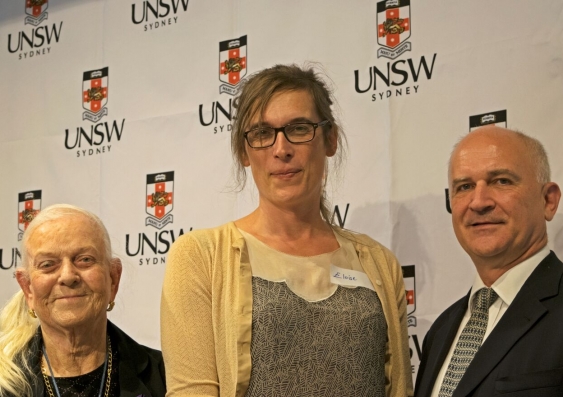Championing better outcomes for transgender staff
Diversity Champion Mark Willcox has launched UNSW’s Gender Affirmation Guidelines, developed to help transgender staff navigate their journey of transition.
Diversity Champion Mark Willcox has launched UNSW’s Gender Affirmation Guidelines, developed to help transgender staff navigate their journey of transition.

In what is shaping up to be a year of firsts, UNSW LGBTIQ Champion Professor Mark Willcox has launched the University’s Gender Affirmation Guidelines, developed to help transgender staff and colleagues navigate their journey of transition at work.
Off the back of supporting UNSW’s first official entry in Sydney’s Mardi Gras Parade, Willcox hosted a launch event for the Guidelines on 26 April.
UNSW Allies and staff were invited to the event, held at the University’s Michael Crouch Innovation Centre.
Speaking at the launch, Willcox said the development of the practical set of guidelines is “an important step forward for transgender staff and UNSW”.
“Change often creates anxiety about the unknown, and as with all change, gender affirmation can affect many people: the individual affirming their gender, the person’s manager, work colleagues, students and other people,” Willcox said.
A teacher and researcher in the School of Optometry and Vision Science and Associate Dean (Research Training) in the Faculty of Science, Willcox is committed to fostering positive outcomes for the LGBTIQ community.
Since being appointed the LGBTIQ Champion among UNSW’s Diversity Champions in April last year, he has supported Wear It Purple Day activities and communicated the need for change.
His vision is to “create a UNSW we can all be proud of”. He said the development of the University’s Gender Affirmation Guidelines was a milestone of significant cultural change.
The Guidelines provide support for both the individual affirming their gender, as well as supportive colleagues (manager, team etc.), and include plans, suggestions and a checklist designed to make the process more streamlined for all involved.
In addition to the Guidelines, support resources for the LGBTIQ community, as well as a glossary of terms, have been provided.
The launch event was also an opportunity to hear from individuals who had experienced gender affirmation themselves.
Eloise Brook, who writes and advocates for transgender people, and former UNSW staff member Katherine Cummings, shared their insights.
Brook, who is also the media spokesperson for the Gender Centre, is about to launch a new project on behalf of the Centre and the Aurora Group, a charity that funds LGBTIQ organisations.
“We hope to help bridge the gap between the way journalists report on trans people, and the actual lived experience of being trans,” she said.
Echoing Willcox’s words, Brook said gender affirmation guidelines were “a key way that organisations can give practical support to transgender staff”.
“I’m pleased to see that UNSW has taken this step,” she said.
Cummings recounted personal stories about her lived experience of being transgender.
Born in Scotland in 1935 and christened John, Cummings grew up in the South Pacific islands.
After completing her BA in Sydney, Cummings moved to Canada to study Librarianship. She went on to pioneer important changes in Australian libraries in the 1970s.
“People who are close to a transgender individual – friends, family, and colleagues – often have a very hard time, as the person they know has changed.” The support information and resources UNSW had provided would facilitate understanding and awareness during this process, she said.
For more information about the Guidelines, visit the website.